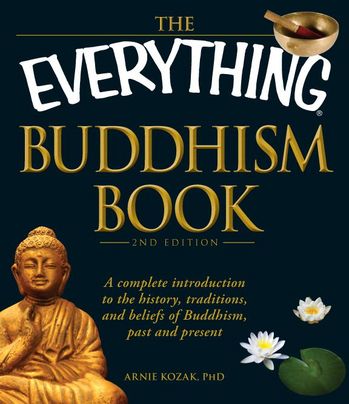 I am pleased to announce the publication of my next book, The Everything Buddhism Book.
I am pleased to announce the publication of my next book, The Everything Buddhism Book.
“My religion is very simple. My religion is kindness.”–Dalai LamaThat’s easy for the Dalai Lama to say–but for the rest of us, understanding this mysterious, multilayered faith can be very difficult. With this updated and revised edition of the classic Buddhist primer, you can delve into the profound principles of nonviolence, mindfulness, and self-awareness. From Tibetan Buddhism to Zen, you’ll explore the traditions of all branches of Buddhism, including:
- The life of Buddha and his continuing influence throughout the world
- A revealing survey of the definitive Buddhist texts
- What the Sutras say about education, marriage, sex, and death
- Buddhist art, poetry, architecture, calligraphy, and landscaping
- The proven physiological effects of meditation and other Buddhist practices
- The growing impact of Buddhism on modern American culture
In this guide, you’ll discover the deceptively simple truths of this enigmatic religion. Most important, you learn how to apply the tenets of Buddhism to your daily life–and achieve clarity and inner peace in the process.
In the opening “Dear Reader” section of the book, I say,
Dear Reader,In 1984 I was at Amherst College with the Dalai Lama for the Inner Science
Conference where His Holiness was lecturing on Buddhist psychology
and Western thinkers provided commentary. The Dalai Lama’s translator
took ill and his substitute wasn’t up to the task of translating the intricacies
of Tibetan Buddhist psychology of mind. The result was hilarious. This is
Buddhism in a nutshell; intellect ultimately yields to experience.
Inspired, I went to India after college and found His Holiness in
Bodh Gaya giving the Kalachakra Tantra. He also guided us through
Shantideva’s Guide to the Bodhisattva Way of Life, culminating in taking
the bodhisattva vows–“I vow to attain enlightenment for the benefit of
all sentient beings.”
It is in this spirit, dear reader, that I offer this book.
From the Introduction:
Buddhism traces its roots back to the Buddha, a yogi who lived more
than 2,500 years ago in northern India. The Buddha discovered a way to
live that radically transformed people’s lives, starting with his own. His revolutionary
insights have withstood the test of time and his methods can still
transform lives as they did in ancient India. The Buddha taught mindfulness,
kindness, and compassion. Buddhism, the family of religions that evolved
from the Buddha’s teachings, is one of the great ethical systems for the benefit
of humanity.
While Buddhism may be considered a nontheistic religion, it transcends
religious belief into practical experience. You don’t believe in Buddhism,
you practice Buddhism. In fact, you don’t even need to be a “Buddhist” to
practice “Buddhism.” You just have to sit down and meditate.
At a time when yoga enjoyed widespread popularity, the Buddha was a
prodigious yogi. He mastered the yogas of his day and then founded a way
that could go beyond all suffering. This way also goes beyond words and
needs to be experienced for yourself. The good news is that is available right
here, right now.
Jane Hirshfield, in the PBS documentary The Buddha, offers an explanation
of the Buddha’s teachings in seven words: “Everything changes; everything
is connected; pay attention.” This is a nice condensing of millions of
words attributed to the Buddha in the Pali Canon. “Everything changes;
everything is connected; pay attention.” Got that?!
Buddhism is flourishing in the West. It seems to offer a much-needed
antidote to the stresses of modern life. It provides a way to renovate your
relationship to uncertainty. It provides a way to renovate your relationship to
want. Christians and Jews alike practice aspects of Buddhism while retaining
their own traditions and marking their own holidays. From celebrities
to the clerk at the gas station convenience store, this vibrant religion is capturing
the hearts and minds of many. Buddhism carries within its belly the
power to transform individuals, societies, and the world. It is a practice of
interior and exterior revolution.

